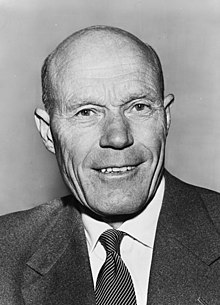Tarjei Vesaas | |
|---|---|
 Tarjei Vesaas (1967) | |
| Born | August 20, 1897 Vinje, Telemark, Norway |
| Died | March 15, 1970 (aged 72) Oslo, Norway |
| Language | Nynorsk |
| Nationality | Norwegian |
| Notable awards | Gyldendals legat (1943) Doblougprisen (1957) |
| Spouse | |
| Children | Olav Vesaas Guri Vesaas |
| Relatives | Sven Moren (father-in-law) Sigmund Moren (brother-in-law) |

Tarjei Vesaas (20 August 1897 – 15 March 1970) was a Norwegian poet and novelist. Vesaas is widely considered to be one of Norway's greatest writers of the twentieth century and perhaps its most important since World War II.[1]
Vesaas' work is characterized by simple, terse, and symbolic prose.[2] His stories often feature rural people who go through severe psychological changes. These works are characterized by their usage of the demanding Norwegian landscape and themes such as guilt and death.[3][2] His mastery of the Nynorsk language has contributed to its acceptance as a medium of world class literature.[4]
A prolific author, he won a number of awards, including the Gyldendal's Endowment in 1943 and the Dobloug Prize in 1957. He was nominated for the Nobel Prize in Literature on 57 occasions (once in 1946, and often multiple times every year between 1950 and 1970).[5]
His novels have been translated into 28 languages. Several of his books have been translated into English—many of them published by Peter Owen Publishers—among them Spring Night, The Birds, Through Naked Branches, and The Ice Palace.[3]
- ^ "Nomination Database". www.nobelprize.org. Retrieved 2017-01-23.
- ^ a b Cite error: The named reference
:5was invoked but never defined (see the help page). - ^ a b "Tarjei Vesaas (1897–1970)". Gyldendal Agency. Gyldendal Norsk Forlag AS. Retrieved April 1, 2018.
- ^ Cite error: The named reference
:0was invoked but never defined (see the help page). - ^ "Tarjei Vesaas - Nomination Database". www.nobelprize.org. Retrieved 2022-06-29.